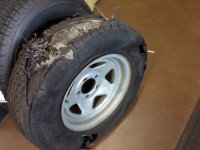T.R. Bauer
New member
- Joined
- Nov 17, 2007
- Messages
- 1,808
- Reaction score
- 1
- C Dory Year
- 1993
- C Dory Model
- 22 Cruiser
- Vessel Name
- C-Whisperer
I have had a couple blow out tire failures on single axle trailers at freeway speeds and other than the, "oh crap I have a flat tire vibration," that went through the trailer and truck, there were not any handling issues at all. The laws of physics states the trailer is going to go in the direction it is going unless a great force causes it to go in a different direction. A flat tire just doesn't change the direction of the force much. The bottom line is the trailer follows the truck - good tires or not.
Bob's advice is good - tires over 5 years old are generally bad news. In fact, I bet 95% of tire problems comes from tires over that 5 year mark regardless of treadlife left in them. Avoiding a blow out certainly makes what trailer type you have a moot point.......
Bob's advice is good - tires over 5 years old are generally bad news. In fact, I bet 95% of tire problems comes from tires over that 5 year mark regardless of treadlife left in them. Avoiding a blow out certainly makes what trailer type you have a moot point.......

